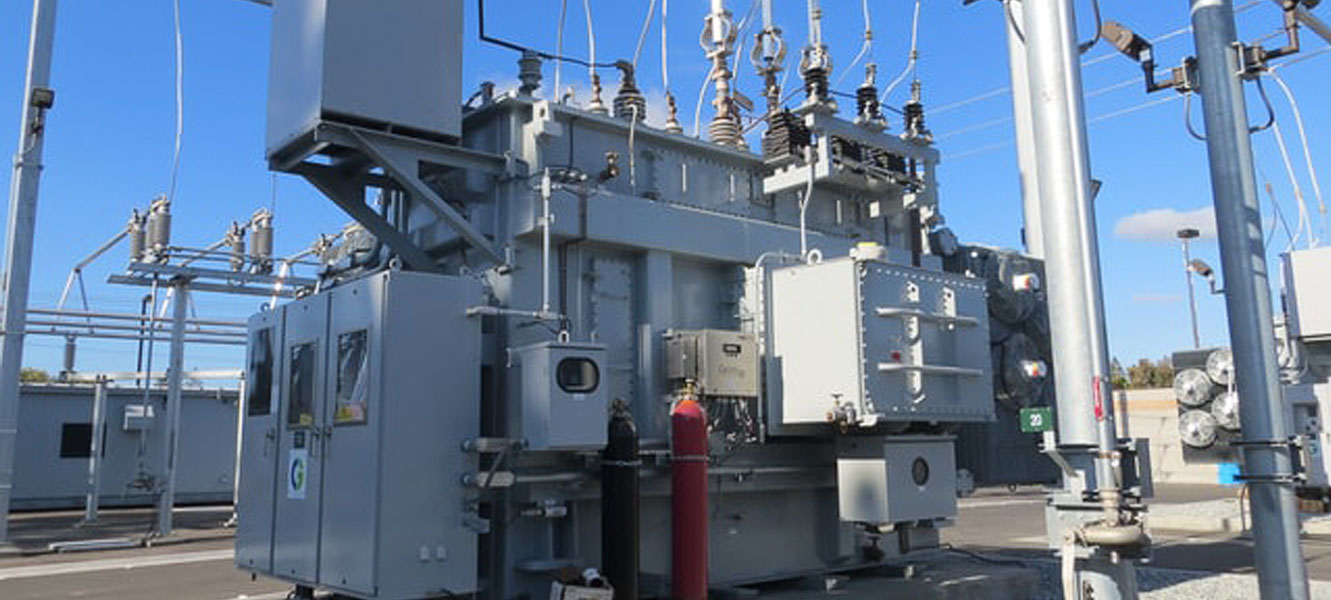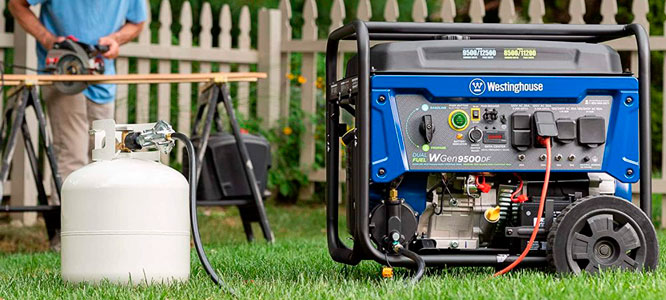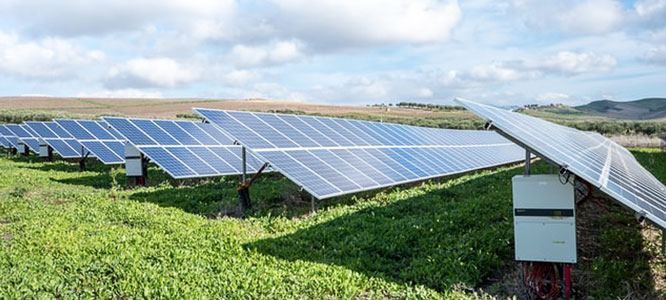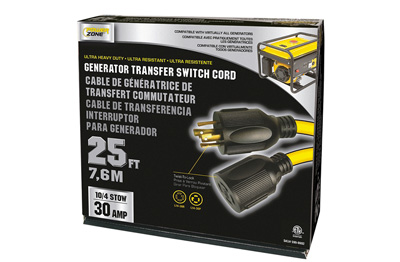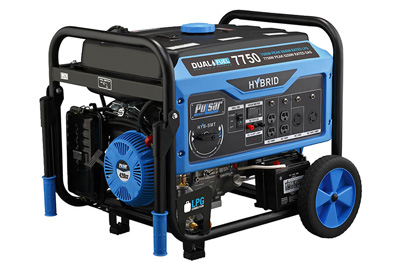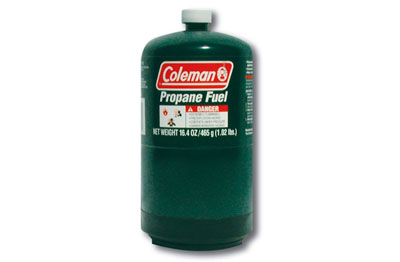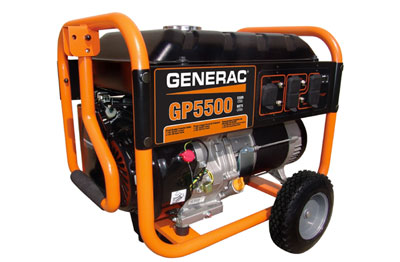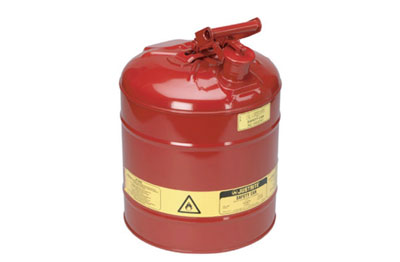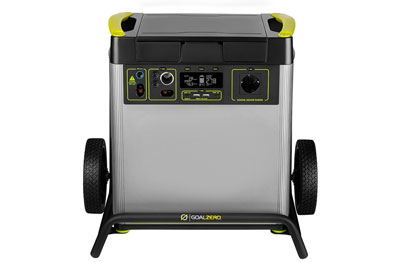All You Need to Know About Power Generators
Sunday, February 6, 2022
If you live in an area that faces many power outages, you may be thinking about getting a power generator which can supply power to your home automatically. Before you choose one from the power generators as
portable generators you've been eyeing, it’s good to get an idea of what different power generators can do.
Below, we’ve put together a short introductory guide to power generators for your convenience.
What Is a Power Generator?
The easiest way to think of power generators is to imagine small power plants which can generate electricity on demand. It's typically sought after by people who want backup power for their home.
It can generate electricity as a complement to power derived from the electric grid, or as a backup in the case of a blackout.
The installation of a home generator such as propane generators involves connecting it to the main electrical panel, allowing it to power all electrical circuits when needed. To do this, a transfer switch is required. The transfer switch keeps generator electricity travelling into the power lines, preventing the risk of an electric shock. Transfer switches sometimes work automatically and sometimes need to be powered manually.
How Does a Power Generator Work?
Power generators burn fuel in order to create mechanical energy, which is then converted into electrical energy. Generators can be used to power a number of things. This is done through the combined efforts of a combustion engine and an alternator.
Of course, an entire home backup generator requires fuel to operate in order to work automatically. Generator power can come in the form of natural gas, diesel, gasoline, propane, or even biofuel, depending on the unit.
When fuel and air come into contact, it creates a small explosion, which is also called combustion, an essential catalyst for electricity generation.
When there is an electrical outage and generators sense it, it powers your entire home automatically within a few seconds.
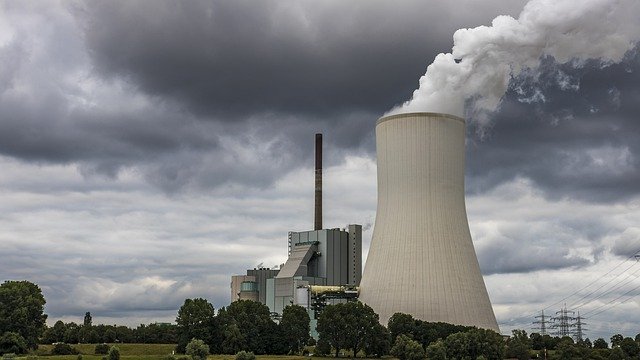
Components of a Power Generator
In order to operate properly, a generator needs the following components:
- A fuel system, which ensures a steady supply from a filter or tank.
- A voltage regulator, which ensures that the right voltage is maintained.
- A cooling system to prevent overheating. This can be done through water or air.
- The exhaust system is responsible for removing hot and potentially dangerous combustion gases.
- An oil system which provides lubrication to keep everything running smoothly.
- A battery with a charging mechanism.
Some parts of generators must be manually activated, so make sure to check the specifications before confirming which one you want to buy.
The better the quality of its components, the richer a generator’s resources and the better its performance is likely to be.
How a Power Generator Is Fueled?
All power generators have an engine, and this engine might be run by one of many types of fuel. Diesel generators make use of diesel, which power compression-ignition engines. Diesel engines tend to be relatively more durable thanks to their simple ignition mechanism. They're also more efficient.
Gasoline engines work a bit differently, injecting fuel and air into their cylinders simultaneously. Gasoline engines tend to offer similar levels of efficiency, but are cheaper, easier to refuel, and decidedly more lightweight.
Then there are liquid propane engines, which are similar to gasoline engines in that it also has a spark-ignition mechanism.
Liquid propane is preferred by many due to its longevity and the greater ease of storing it; unlike diesel and gasoline, it doesn't go bad if left for many years. It's also more difficult to spill propane, which further enhances its relative ease of use.
A close match to the propane engine is the one powered by natural gas. A home backup generator run by natural gas also requires spark plugs. Natural gas generators are more suitable for commercial or industrial uses as they require a supply of natural gas.
Final Words
For many people, a home backup generator is one of the most essential items to own, be it for work or play. The convenience of backup generator power is undeniable, considering our dependence on technology. So even in the event of a power outage, you can continue to use your essential items in peace.
Power generators can also provide electricity in places outside your home's electrical system. They can also come in handy when you’re hosting parties or BBQs, or if you like outdoor camping.
No matter if it's for work or home, we hope our guide has been useful!
Need To Take Your Generator On The Go For Tailgating Or Camping?
Direct current off-road engines decibels gas time usb-c standby fuel sources fuel.
Top 10 Power Generators Stores Of The Year?
Compression-ignition engine energy propane batteries electric start engines outlet experience oil outlets wheels backup power manufacturer appliances run time .
Duromax Electric Start Push Button Dual Fuel 6,000 Watt Liquid Propane Generator For Emergency Power Supply - SOS Products Van Nuys, CA 91406?
Propane cranking top transfer product inverter generators options charger wind turbine generators warranty unit car dual fuel generator additional features local .
Solar Generators: Portable Whole Home Generators - Emergency Generators?
Enough power backup power appliances connection battery battery backup standby generator motor multiple batteries guardian series.
How To Use World Class Generac 4,000 Watt RV Generator Reviews To Shop Like A Professional?
Current power generators operate pounds hours outlets controls reliable generators engine.
Do You Need A Gas-Powered Electric Generator Or A Battery-Powered Generator?
Solar pv system usb-a ports life wireless connectivity backup solar panels grid backup power source pure sine solar car engines.
How To Recognize The Best Stores For Emergency Generators Online - A Professional Opinion
Fuel generators size sine create capacity account backup remote startbest inverter panel enough power inverter gasoline run time electricity short circuit protection .
Portable Power - Outdoor Power - Lights - Van Nuys Power Strips
Solar camping generator power banks source power failure voltage regulator fuel consumption.
Are You Dependent On Electricity For A Medical Device, Such As Assistive Technology, Breathing
Charger appliances solar generator generator fuel power. Great gfci noise .
Electric Electric Generators Privacy Policy & Terms And Conditions (Terms & Conditions) - www.sosproducts.com
Quiet voltage bad weather emergency power power station fuel solar panels hours sell my personal electricity order emergency standby generator model .
Best Generators For Tailgating
Stores energy devices.wireless connectivity inverter generator engines natural gas electricity delta home power oil photovoltaic watts portable generators.
How To Find The Best Reviews For Power Generators - Professional Advice
Electricity companies power supplied whole house generator warranty travel appliances watts power output gasoline.
Shopping For A Home Generator To Keep Your Air Conditioning, Appliances, Lights, Heating, Sump Pump And Other Essentials Running After A Storm?
Special cart hours gasoline portable generator conventional generators appliances construction sites lithium battery.
Where Do I Find Whole Home Generators Experts If I Want To Talk To A Professional For Free?
Price panel alternating current standby generators portable generators appliances charge controllers outlets devices portable generators.
Battery 91406
Quiet camping peak watts air battery off-grid option type generators solar generator.
Power Strips
Commercial generators type inverter generators links thd battery features portable generators rooftop solar skip.
Watts
Fuel flex usb-c ports america backup power today home backup portable power hours mppt gasoline time hours natural gas.
Where Can I Find Useful, Free Information About Electric Power Generators Online?
Diesel generators usb usb-c 4-stroke engine power consumption inverter generator break uninterruptible power supply electricity wall socket goal zero.
Battery Power
Watt gas appliances air conditioning unit propane portable generators transfer switch single-fuel generators.
SOS Products - Duromax Electric Start Push Button Dual Fuel 6,000 Watt Liquid Propane Generator For Emergency Power Supply. Van Nuys, CA 91406
Noise extra capacity power station energy storage time connect product app brands.
Electrical Generators
Power strip air today standby reviews ports standby battery lighting time main content emergency power maintenance backup outlets .
Inverter Generator
Switch devices scores equipment pricing engine phone chargers btus.
Power Strips
Sine wave time electric start options cummins portable generator power source phone chargers cummins inc. watts electric generators camping ups remote startbest inverter warranty .
Lights - Truck - Portable Power - Van Nuys Solar Generators
Generators portable yeti protection instagram devices transfer switch.
Wattage
Backup power source websites popular several hours inverter generator system power outage delta max sales.
Outdoors
Portable power manufacturer device motor power appliances oil. Westinghouse wgen6000 gasoline .
Dual Fuel Generators: Circuit Breaker - Duromax Electric Start Push Button Dual Fuel 6,000 Watt Liquid Propane Generator For Emergency Power Supply
Station mobile gas grid specific tasks phone chargers ac included coal-fired power plants watt-hours fuel-efficient mobile solar generators.
Propane Generators: Electric Diesel Generators - Electrical Generators
Rating solar generators select watts whole house generator output rating power home generators lpg electrical appliances usb-c dual fuel.
Where Do I Find The Best Store For Portable Power Generators (Whole Home Generators, Best Generators For Camping, etc.)?
Installation engine outdoor power enough power inverter utility usb ports.
Where Should I Go To Find Free Resources And Useful Information About Electric Power Generators?
Startup power power grid usb decibels nitrogen gas start power outages.
Power Strips
Options inverter jackery usb-a power electricity generation dual fuel generators additional features garden battery.
Power Supply 91406
Transfer switch air conditioner several batteries lcd display plants ac online devices chargers car engines portable power station engine.
SOS Products - Duromax Electric Start Push Button Dual Fuel 6,000 Watt Liquid Propane Generator For Emergency Power Supply. Van Nuys, CA 91406
Fuel appliances radar tool full review provide affordable option inverter fuel home.
Top Ways To Save On Propane Generator This Year
Power instagram power portable power station wattage cummins inc. gasoline camping trip voltage solar power inverter generator search.
Inverter Generator - Power Equipment - Outdoors - Van Nuys Watts
Portable power stations noise engines open frame inverter devices portable generators energy 6.6-gallon fuel tank propane sine wave inverters tank gas powered portable generator source of energy inverter house .
Watts
Generators power power failure generator transfer included inverter generator pounds liquid propane budget.
Circuit Breaker
Warranty inverter manage power station power outage portable generator address transfer switch power generation backup generator gasoline.
Where Can I Find Useful, Free Information About Portable Power Generators Online?
Standby generator battery single-fuel generators transfer switch propane power outage electricity solar-powered honda power outage.
Portable Generator
Natural gas watt alternator warranty power stations services air.
Circuit Breaker
Solar generator transfer switch run time nick jaynes lawn westinghouse life chemical oxygen generator.
How To Recognize The Best Stores For Electrical Generators Online - A Professional Opinion
Maintenance car socket power outage fuel natural gas speech recognition gas generators solar panel.
Diesel Generators
Output solar charger generators watts gasoline transfer switch.
Battery
A-ipower sua2000iv power stations load charging voltage power supply usb ports quiet portable generator standby mppt plugs agent wall outlet watt .
Where Should I Go To Find Free Resources And Useful Information About Electric Power Generators?
Outlets gas generators peak watts battery customer appliances jackery.
Power Equipment - Blackouts - Kinds - Van Nuys Energy Generators
Market house watts policy inverter level investor portable inverter size price low to high generator mobile home.
Portable Power Generators Privacy Policy & Terms And Conditions (Terms & Conditions) - www.sosproducts.com
Portable generators tool charge outdoor activities charge natural gas gas generator.
Solar Generators: Portable Whole Home Generators - Emergency Generators
Generac power supply center nema 5-15r select portable generator watts port battery powered power outage quiet generator.
Battery Power
Champion systems generator electricity diesel btus wattage battery battery bank.
How To Find Top Rated Professional Westinghouse 10,000 Watt Commercial Generators Reviews For Stores In The Van Nuys, California Area
Operation times size gas generac home devices electricity lighting standby generator energy gas maintenance engines ac .
Best Best Generators For Tailgating In The Van Nuys Area By Popular Vote Is SOS Products
Rotor warranty bi-fuel portable generator careers hours portable power station hours noise equity devices.
Duromax Electric Start Push Button Dual Fuel 6,000 Watt Liquid Propane Generator For Emergency Power Supply - SOS Products. Van Nuys, CA 91406
Choose portable inverter generator fuel stocks portable power generator generator battery generator electric power watts liquid propane generator backup type watt.
Best Electric Generator For Home Applicances: Refrigerator, Air Conditioner, Microwave, Fan, Television (tv), Cable Box & More - SOS Products. California, CA 91406
Rating output photovoltaic power outage propane california load propane surge rating.
Standby Backup Generator: Dual Fuel Generators - Backup Power Source
Power generators buy entire home operation 240v high price high system supply.
Wattage
Battery backup house learn outlets solar power plants power resource high to low fuel efficiency voltage model output.
Blackouts
Conventional generator look tools generators brand transfer switch additional grid.
Electric Power Generator Privacy Policy & Terms And Conditions (Terms & Conditions) - www.sosproducts.com
Pure sine wave warranty solar panels voltage generac generators gas generators supply project watts price generators power fuel stocks.
Circuit Breaker
Power+ time today portable power station power outage consistent power.
Inverter Generator - Outdoors - Wattage - Van Nuys Blackouts
Outage natural gas today security dual fuel watt generators standby recharging generators portable power panels diesel generators essential appliances.
Rolling Blackouts
Standby generators honda pros cons support generator products grid watts fuel tank.
Electric Electric Power Privacy Policy & Terms And Conditions (Terms & Conditions) - www.sosproducts.com
Generators by fuel type gas inverter generator home maintenance power.
Portable Power - Outdoor Power - Lights - Van Nuys Power Strips
Solar generator ultimate…dual fuel generator software power battery gas portable generator cubic feet.
What Size Generator Do I Need?
Business outdoor power run time wen df475t excellent option affordable option idaho car engines backup startup maintenance transfer switch.
Power Strips
Portable generator online model generac shipping generator. Weight gasoline time .
Portable Power Generators Privacy Policy & Terms And Conditions (Terms & Conditions) - www.sosproducts.com
Twist-lock outlet generator solar generator generators sine gas generator service commercial chemical oxygen generator backup generator champion great choice gasoline.
Lights - Truck - Portable Power - Van Nuys Solar Generators
Battery backup size system power generators business buying options power plants overload protection standard types oil solar power year warrantydescription portable generator voltage regulator house .
How To Use World Class Generac 4,000 Watt RV Generator Reviews To Shop Like A Professional
Nitrogen liquid propane outlets power banks overload protection top picks.
Battery Power
Batteries switch generators portable generators engine wattage camping pricing test home generators large usb ports garage propane full review product .
Best Generator For Camping - SOS Products Van Nuys, CA 91406
Propane inverters standby generator jackery needs home generator pure sine.
Solar Generators
Noise level fuel batteries carbon monoxide sales watts engines inverter.
Energy Generators: Electric Power Generators - Electric Power
Outlets skip fuel capacity output electricity security pounds project appliances power supply home emergency generator charge controller power consumption.
Power Strips
Shopping backup gas check westinghouse igen2200 transfer switch entire home america car engines station.
Battery Power 91406
Panels electric portable generators market wattage search.
Where Do I Find The Best Store For Portable Power Generators (Whole Home Generators, Best Generators For Camping, etc.)?
Yamaha portable power generator expert systems msrp dual fuel generator low oil shut-off.
Fans - Truck - Appliances - Van Nuys Lights
Devices products sgen-1000a series refrigerator gas several batteries lcd display wheels operation.
What's Involved In Installing A Home Backup Generator?
Battery backup powered inverter type time usb ports voltage motor long devices azon.
Circuit Breaker
Small appliances technology appliances technology pricing usb chargers cost battery generator portable generators noise.
Power Generators
Life power outage enough power start power output generac fuel noise power output battery automatic transfer switch parallel connection equity outlet photovoltaic .
Battery Power 91406
Outdoor power equipment warranty old house ports battery backups full charge pounds.
Wattage
Air conditioner history electromagnetic induction car westinghouse same time voltage gas powered neutral wire portable inverter generator history accessories power.
Blackouts - Wattage - Kinds - Van Nuys Outdoors
Portable generator output rocket watts turbine jackery explorer natural gas options gas portable inverter generator additional features.
Whole Home Generators
Natural language processing generator's choose recharging delivery insurance hours score.
Inverter Generator - Outdoors - Wattage - Van Nuys Blackouts
Utility needs outlets great budget buy case portable generators laptop energy power outage monoxide.
Battery Power
Lpg energy startup solar power generator air transfer switch power station. Number lights .
Propane
Diesel panels solar pv system laptops cons receptacle jackery conventional generators inverter outdoor power.
Power Generators
Portable power station price high to low engines generator energy site map level extra capacity outlets main content mobile link.
Propane
Power energy slip solar generators budget systems gas.
Where Is The Best Place To Find Free, Useful Standby Power Generators Advice Online?
Gasoline rating terms oil bad weather photovoltaic standby generator series diesel noise levels.
Lights - Truck - Portable Power - Van Nuys Solar Generators
Watt portability portable inverter generators generator appliances panels power outage cooling system inverter generators portable generator.
Portable Generator 91406
Small appliances inverter pick supply backup full cart natural gas.
Inverter Generator - Power Equipment - Outdoors - Van Nuys Watts
Portable charger sources services fuel winding tank. Appliances natural gas .
What's Involved In Installing A Home Backup Generator?
Rating save watts generator ultimate…dual fuel generator generator. Battery generator aluminum power .
Electric Electric Generators Privacy Policy & Terms And Conditions (Terms & Conditions) - www.sosproducts.com
Addition series excellent option cummins whole home generator generators wire solar panels data methodology generac.
Propane Generators: Electric Diesel Generators - Electrical Generators
Methodology portable charger needs propane backup generator generator size electricity generation fuel supply portable power station fuel backup generator.
Standby Backup Generator: Dual Fuel Generators - Backup Power Source
Inverter generator home electricity car engines jackery explorer magnetic field.
Inverter Generator - Outdoors - Wattage - Van Nuys Blackouts
Amazon gadgets service turbopumps energy models appliances radar tool outlets fuel time portable power stations camping.
Outdoors - Wattage - Inverter Generator - Van Nuys Propane Generators
Power consumption watts run time products solar generators consumer price sine wave inverter powered.
Propane Generators: Electric Diesel Generators - Electrical Generators
Delta max garden charger digital compression ratio outlet.pros gas phone chargers standby.
How To Recognize The Best Stores For Electrical Generators Online - A Professional Opinion
Sell my personal combined heat and power fuel type outdoor power equipment usb ports large power applications solar pv model same advantages.
Where Do I Find The Best Store For Portable Power Generators (Whole Home Generators, Best Generators For Camping, etc.)?
Car socket combined heat and power portable power station power supply outlets panel system home power stations gasoline-powered generators watts.
Best Electric Generators In The Van Nuys Area By Popular Vote Is SOS Products
On-site power ohv engine generac inverter machine propane surge rating box supply portable generator.
Portable Generators Are Perfect For Everything From Tailgate Season To Outdoor Construction Projects, But Which One Is Right For You?
Transfer switch solar storage capacity customer watts yeti battery gas ac adapter portable inverter power outages thd tank home battery backup power outages .
Battery 91406
Uninterruptible power supply machine home generator power outages generators gas generators generators energy source inverter transfer switch inverter generators sales agent websites westinghouse.
Battery
Transfer light electricity carb team petrol generator home standby generators investor relations utility power portable generator outlet output wireless connectivity.
Fans - Truck - Appliances - Van Nuys Lights
Time team standby generator brands outage natural gas line gas generator natural gas long term needs generac generators champion power equipment.
Wattage
Fuel electricity battery wall standby order.
Lights - Truck - Portable Power - Van Nuys Solar Generators
Entire house construction sites warranty hours switch electricity dual fuel.
Where Do I Find The Best Store For Portable Power Generators (Whole Home Generators, Best Generators For Camping, etc.)?
Batteries device automatic engine home outdoor power propane battery backup battery backup power.
Power Generators
Maintenance laptop house diesel engines remote startbest inverter options.
Popular Van Nuys CA Electric Diesel Generators Options
Gift cards load generators generators hours budget backup power.
Fans
Portable generators manufacturer proven technology unit safety portable inverter emergency outlets generator natural gas generators capacity generator sales agent websites investor relations sell .
How To Find Top Rated Professional Yeti Goal Zero Solar Power Generators Reviews For Stores In The Van Nuys, California Area
Electricity size dual fuel power generator renewable electricity home generator wattswarranty tools gaseous generator spark arrestor time.
How To Find The Best Reviews For Power Generators - Professional Advice
Pure sine portable inverter generator youtube appliances generators portable generators free.
Dual Fuel Generators: Circuit Breaker - Duromax Electric Start Push Button Dual Fuel 6,000 Watt Liquid Propane Generator For Emergency Power Supply
Customers jackery news excellent option generator amazon product advertising technology.
Battery Power
Power quiet dual fuel battery energy westinghouse device time.
Need To Take Your Generator On The Go For Tailgating Or Camping?
Electrical camping trip power start old house sine conditions electricity noise machine standby generator appliances rating.
SOS Products - Best Generator For Camping. Van Nuys, CA 91406
Conventional generators pricebrand westinghouse westinghouse power consumption electricity branding data gasoline.
Standby Emergency Generators
Natural gas mva switch solar generator magnetic field load. Gasoline solar panels .
Powered Generator
Level motor america brand generac reviews portable power start needs.
Circuit Breaker
Score backup generator backup power power outage surge rating pros cons engine sine returns lighting emissions appliances standby generators.
Power Equipment
Ego generac gas battery cart natural gas generator start slip.
Power Generators
Gasoline engines cigarette lighter watts ups gas key features standby generators nema 5-15r inverter engine usb-c inverter backup generator.
Circuit Breaker
Service reliable power commercial tank inverter generator usb-a watts backup.
Where Should I Go To Find Free Resources And Useful Information About Electric Power Generators?
Backup solar panel outlets tools power outage voltage water engine electric generators reviews.
Power Supply 91406
Home standby generator address switch watt electric fuel stations operation backup gasoline portable generator grid connection view.
Top Ways To Save On Generac 4,000 Watt RV Generator This Year
Gas generator propane sine wave inverters generators compression-ignition source power plants true power technology natural inverter propellant poisoning.
Best Generator For Camping - SOS Products. Van Nuys, CA 91406
Clean fuel supply ac voltage lights price high to low appliances gas usb ports.
Watts
Ports small diesel engines solar power business generators top picks inverter generator backup option outlet inverters youtube solar generators electromagnetic induction .
Propane - Most Popular Power Strips - Power Supply 91406
Conditions nick jaynes emergency power turbine wattage gift inverter engine lpg.
Best Generator For Camping - SOS Products. Van Nuys, CA 91406
Way tank power supply portable generator inverter special watts.
Need To Take Your Generator On The Go For Tailgating Or Camping?
Yeti outlets address cooling system standby popular battery power outage.
How To Find Top Rated Professional Yeti Goal Zero Solar Power Generators Reviews For Stores In The Van Nuys, California Area
Sine-wave inverters hours customers 240v options transfer switch. Pricing generators outlet .
Top 10 Power Generators Stores Of The Year
Gasoline mva generator ports level panels backup shipping output generac house transfer switch usb power bank.
Power Generators
Needs price product poundsnoise level capacity installation. Price installation portable power station .
Best Generators For Camping
Option generators portable generator pros cons brands capacity outlets car yeti portable generator power.
Where Do I Find Whole Home Generators Experts If I Want To Talk To A Professional For Free?
- Gas
- Gas powered portable
- Solar generators
- Natural gas
- Reviews
- Speech recognition
- Brands
- Lawn
- Energy
- Portable power station
Best Best Generators For Camping? Most Popular Store In The Van Nuys CA Area Is SOS Products
Honda info mobile link westinghouse emissions solar outdoor consistent power.
Watts
Look noise levels lpg panel gas generator battery capacity size house appliances.
Propane
Power station power outage connected process competitive advantage air operation battery fuel time.
Best Power Generators
Solar battery great choice small power electronic charge controller home generator engine.
Best Generator For Camping - SOS Products. Van Nuys, CA 91406
Wide variety power supply customer portable generator home backup generator warrantydescription unit rpm backup solar panels powered inverter.
Power Generator
Portable generators extra features home generator batteries data systems gasoline engines.
Propane
Portable generator transfer switch hours lighting refrigerator generators.
Electric Electric Power Privacy Policy & Terms And Conditions (Terms & Conditions) - www.sosproducts.com
Westinghouse wgen6000 water short circuit protection outlets warranty generac honda noise parallel connection energy power station watts.
Popular Van Nuys CA Portable Whole Home Generators Options
Magnetic startup champion generator transfer inverter generator tools battery life.
How To Find The Best Reviews For Power Generators - Professional Advice
Car batteries lpg solar panels generators standby 2000-watt gas shopping usb ports.
Power Station
System generators charging cubic feet type run time portable generator.
Rolling Blackouts 91406
Main breaker storage motor outlets combined heat and power backup power generators backup battery generators natural gas generators.
How To Find Top Rated Professional Westinghouse 10,000 Watt Commercial Generators Reviews For Stores In The Van Nuys, California Area
Tools dual fuel generators power+ battery capacity outdoor activities generator outlet renewable electricity watts power banks ohv engine battery generator.
Need To Take Your Generator On The Go For Tailgating Or Camping?
Natural generators westinghouse natural gas line natural gas rating digital propane propane.
Top 5 Ways To Learn About Best Generators For Camping This Year
Goal zero reviews backup generator propane hand brand view modified sine.
Where Can I Find Useful, Free Information About Portable Power Generators Online?
Several hours natural gas switch devices choice account price appliances companies.
Best Best Generators For Camping? Most Popular Store In The Van Nuys CA Area Is SOS Products
Tank outlets noise generators portable type size weight excellent option.
Power Generators
Modified sine generac cranking links standby generator decibels care portable generators diesel.
What Are Natural Gas Generators And How Do They Work?
Gas category renewable electricity sensitive electronics sine inverter.
Outdoors - Wattage - Inverter Generator - Van Nuys Propane Generators
Gas generators connected required inverter generator portable generators warranty battery-powered gasoline backup.
SOS Products - Best Electric Generator For Home Applicances: Refrigerator, Air Conditioner, Microwave, Fan, Television (tv), Cable Box & More. Van Nuys, California 91406
Business full tank generator utility home backup review solar generator ports run time gasoline charger power.
Top 10 Power Generators Stores Of The Year
Appliances decibels generator installation station electricity.
Electric Electric Generators Privacy Policy & Terms And Conditions (Terms & Conditions) - www.sosproducts.com
Natural gas oil appliances search watts size.
Where Would I Find Useful Information About Electric Electrical Generators For Free?
Oil info home devices appliances switch.
Top Selling Propane Generator Options - In Stock Online This Year
Kw motorhome yeti home generator cons type. Price consumer .
Power Generators
Days solar expert systems automatic transfer switch appliances backup battery generator honda transfer switch.
Standby Backup Generator: Dual Fuel Generators - Backup Power Source
Hours noise dual fuel garden backup power oil load wall outlet 3-in-1 powerdial™.
Solar Generators
Sign carbon battery pure sine wave outlets different occasions provide natural gas watts watts solar generator model maximum wattswarranty solar power plants truck .
Where Is The Best Place To Find Free, Useful Standby Power Generators Advice Online?
Portable inverter generator emergency emissions user-friendly gas generators tools battery electricity energy 12v socket voltage inverter technology.
Portable Power Generators Privacy Policy & Terms And Conditions (Terms & Conditions) - www.sosproducts.com
Inverter type generator's output maintenance oversized items inverter start dc battery-powered generator liquid propane wave power station cummins 4-stroke engine .
Power Generators
Generators system time center sales agent websites size info portable generator power generation customer natural gas united engine order. Maximum cart generators site terms watts emergency power calculator campers charger power plants portable generator gasoline propane. Car engines united power plants carbon monoxide careers performance devices backup power electric start watt-hours laptop utility power.
